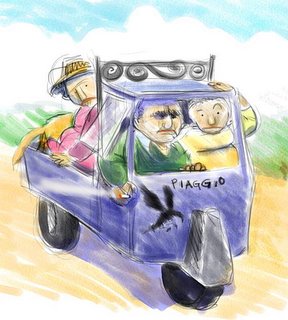A pedagogy of laughter
 Today is the blog translation carnival. I translated Pedagogia de Riso by João Vasconcelos Costa of Reformar a Educação Superior and he has translated my post Lovers of laughter, lovers of life on his blog into Quem gosta de rir gosta de viver.
Today is the blog translation carnival. I translated Pedagogia de Riso by João Vasconcelos Costa of Reformar a Educação Superior and he has translated my post Lovers of laughter, lovers of life on his blog into Quem gosta de rir gosta de viver. We've also decided that blog carnival or not, we're going to translate one of each other's posts every month! So here goes JVC' thoughts on a pedagogy of laughter:
++++++++++++++++++++++++
I’ve written a lot about my enthusiastic contribution to the Bolonha Project at the U. of Madeira. On the page I’ve just linked to you can see that the discussion is well underway, but I hope that the texts speak for themselves, showing the difference between open and imaginative positions and some, just a few, examples you expect from traditional narrow-mindedness.
In the middle of this discussion, we get the interesting participation of Kurt Millner (KM). He’s a young man (compared to me), a teacher of German and of Austrian nationality. A few days ago, he wrote something challenging in relation to transversal competences:
“I forgot, in my previous post, in the parts that refer to ‘transversal competences’, to highlight a very important ‘competence’ which I consider underlies, in one way or another, all the documents and contributions and interventions in the scope of the Bolonha Debate, in the UMa, and that I recognize without any exception, literally all those people who I’ve dealt with in the five, six years I’ve been in Madeira, whether it’s in the gorcer’s shop or in the University Senate, and that is the ‘competence of humour, of smiles and of laughter’.”
So has anyone remembered this? In thousands of pages about the paradigm of Bolonha or about new liberal education in the USA, I haven’t found it. I would also add, as I wrote after Millner, the stoic competence of “to know how to cry, to know how to lose, and both with dignity.”
This is what I replied: “Splendid! It’s my whole attitude to life. There is no valid serious writing if we can’t raise, even if it’s only for ourselves, a smile. I am, essentially an epicurean. (…) Getting back to the smile, but without forgetting Vienna. One of my patrons is Thomas Moore. Any educated person will know his serious life and of “Utopia”. But many people don’t know his satirical writings, sometimes even bordering on the obscene. And aren’t the scatologies of Bocage splendid? But I’m still going to add one more thing.
I have three registers in writing. I regularly send messages to a select list of friends. There, I talk without reserve of what I think to be a good sense of humour, we exchange jokes and humerous videos. Then, I have the notes and jottings of my place, where I have to control myself but where I can’t resist the odd joke. Finally, the serious articles. I don’t know if you’ve noticed that, on first impulse, I often add a final playful note, which, after a prudent sleep, I delete the following day.
A good morning chuckle from a joke on the net keeps me smiling all day. I can’t stand ascetics. Do you remember “The name of the Rose”? Everything rotated around a hypothetical “Treatise on laughter ”, of Aristotle. Would that it had existed and that I had read it.
And this has nothing to do with teaching? Wrapped up in a funny or attractive story, students learn the essential message very well. Sorry for the personal reference that follows, but I think it could be interesting for readers.
One day I had to write about my lessons about AIDS, preceded by one hour of a story– unhappily, in this case, not a funny one – that included Mobuto, Haitians, economic segregation in the USA, the back rooms of gay bars, the sad story of a Portuguese pseudo-scientist in South Africa, the interests of multinational pharmacies and much more.
My lessons are full of anecdotes, often about the news from the paper I read in the café before the lesson and remembered, or which, spontaneously, comes to my head (I never do the traditional “lesson preparation”, it’s what comes out in ‘performance’, the rest come in books. A lecturer is an author/actor). Maybe it’s for this reason that I always have over two thirds of my students who loyally come to classes and who come to sit with me, on their initiative, at the table of the bar, whether it’s to talk about football (there are also important things to say about this). Once, I asked why. One reply delighted me: “because your lessons are such fun!” But they learn! And maybe this also has to do with my fascination for the “new” liberal education, that I consider would be a better fulfillment of the Bolonha paradigm.
++++++++++++++++++++++++++++++++
Tags: educaçaosuperior, bolonha








